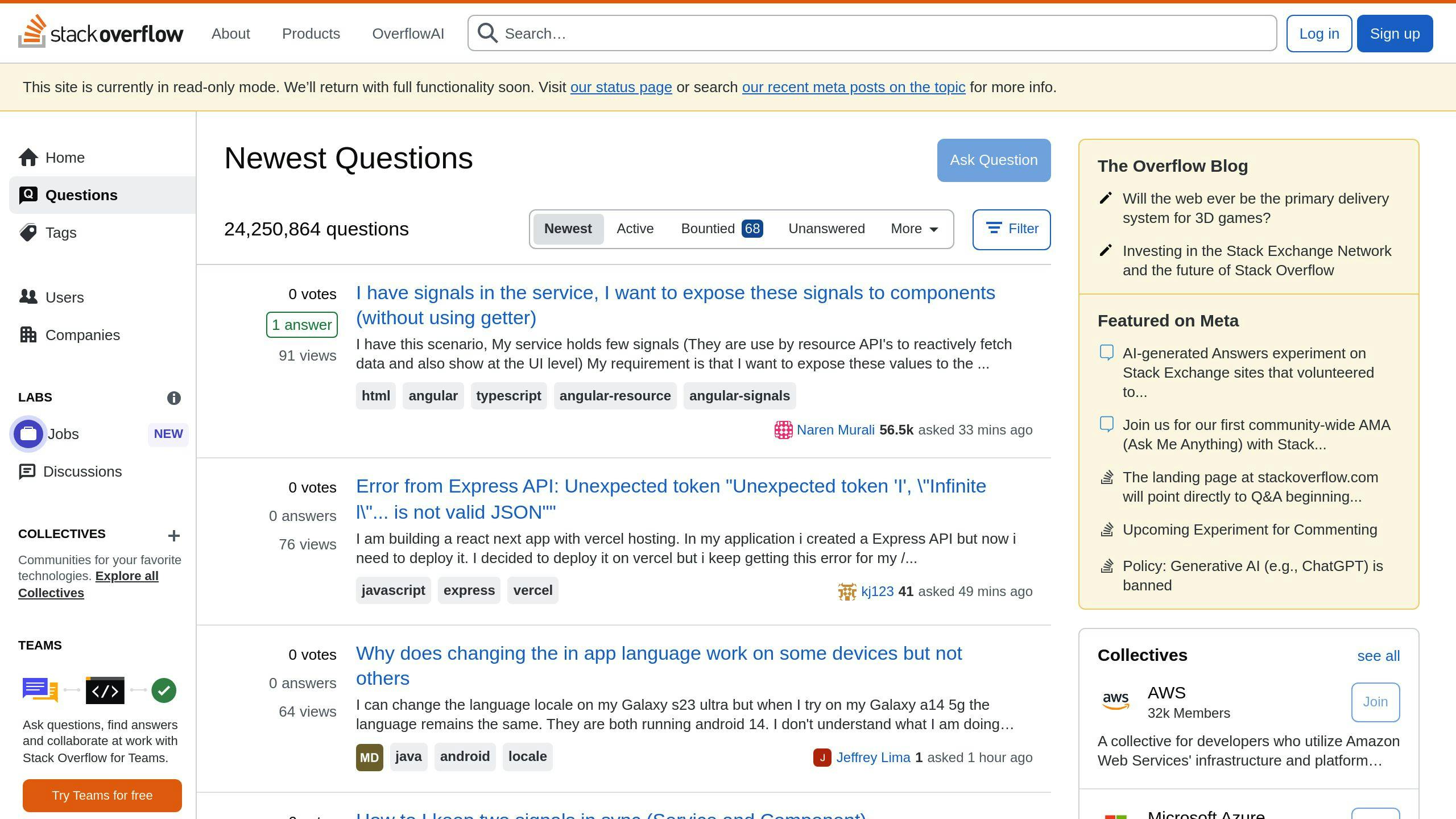Staying updated with technology trends is essential for students aiming for tech careers. Here’s how you can do it for free:
- Learn Online for Free: Use platforms like Coursera, edX, and FreeCodeCamp to gain skills in areas like AI, cybersecurity, and web development.
- Join Tech Communities: Engage with GitHub, Stack Overflow, and Reddit to network, solve problems, and explore open-source projects.
- Follow Tech News: Stay informed using TechCrunch, Hacker News, and Dev.to. Use tools like Feedly to organize updates.
- Attend Free Tech Events: Websites like Eventbrite, Meetup, and GitHub Events list workshops, hackathons, and networking opportunities.
- Use Social Media: Follow tech leaders on Twitter, LinkedIn, and YouTube to learn from their insights.
- Career Platforms: Explore KodNest and similar platforms for structured learning and job-ready skills.
Quick Comparison
| Resource Type | Platforms/Tools | Key Benefits |
|---|---|---|
| Free Learning | Coursera, edX, FreeCodeCamp | Theoretical and hands-on coding skills |
| Communities | GitHub, Stack Overflow | Networking, practical experience |
| Tech News | TechCrunch, Hacker News | Spot trends, industry insights |
| Free Events | Eventbrite, Meetup | Workshops, hackathons, networking |
| Social Media | Twitter, LinkedIn, YouTube | Quick updates, expert insights |
| Career Platforms | KodNest, Scaler, Udemy | Structured learning, placement assistance |
Tip: Dedicate 1-2 hours daily to learning and networking. Focus on tools and communities that align with your career goals.
Free Online Learning Resources
Free online tech education provides students with access to a wide range of high-quality resources. Here’s how to make the most of them.
Coursera, edX, and FreeCodeCamp Overview

| Platform | Focus Area | Ideal For | Certification Options |
|---|---|---|---|
| Coursera | University-level courses | Theoretical learning | Free to audit, certificates available for purchase |
| edX | Professional programs | Career-focused learners | Free access to materials, certificates available for purchase |
| FreeCodeCamp | Coding practice | Hands-on learners | Completely free certifications |
Coursera partners with universities to offer courses that include free auditing for video lectures and materials. edX specializes in structured programs like MicroMasters, particularly in IT and cybersecurity. FreeCodeCamp takes a practical approach with coding challenges, projects, and free certifications.
These platforms cover in-demand topics such as AI, cybersecurity, and web development, helping learners align with current industry trends.
Getting the Most from Free Courses
- Set Clear Goals: Define what you want to achieve. Focus on skills that are important for your career and align with emerging technologies.
- Stick to a Routine: Dedicate 30-45 minutes consistently for learning. Regular intervals will help you absorb content better.
- Leverage Platform Tools: Participate in forums, complete exercises, and engage in peer reviews. Practical assignments and projects are key to applying what you’ve learned.
- Track Your Progress: Use tools on the platforms to monitor your growth. Set milestones and test your knowledge through quizzes and challenges.
While these courses provide a strong knowledge base, connecting with tech communities can offer valuable networking opportunities and insights into practical applications.
Tech Communities and Forums
Free courses can help you get started, but tech communities offer something extra: practical experience and networking. These platforms connect learners with seasoned developers, encourage solving real-world challenges, and spark industry-wide discussions.
Using GitHub, Stack Overflow, and Reddit

GitHub is a fantastic place to dive into open-source projects. You can learn by reviewing code or submitting pull requests. Stack Overflow is packed with millions of programming questions and answers [1], making it a go-to for solving technical problems. Meanwhile, Reddit hosts diverse tech communities where you can explore industry trends and discussions.
| Platform | Primary Use | Key Benefits |
|---|---|---|
| GitHub | Code collaboration | Explore open-source, version control |
| Stack Overflow | Q&A discussions | Solve problems, learn best practices |
| Community forums | Discover trends, industry insights |
Subreddits like r/webdev and r/javascript are goldmines for keeping up with the latest tools and practices [1]. These forums blend technical knowledge with career tips, making them a well-rounded resource for growth.
Community Participation Guide
To truly benefit from tech communities, you need a strategic approach. Start by creating a detailed profile that highlights your skills and goals. Once you’ve chosen the right platforms, active engagement is the secret to success.
Here’s how to make the most of your participation:
-
Ask and Answer Questions:
Post clear, specific questions and share your attempts to solve them. When answering, focus on problems within your expertise and include helpful details like code snippets [2]. -
Contribute Professionally:
Get involved in GitHub discussions and open-source projects. Make meaningful contributions that show your dedication and ability [1].
Regular participation can open doors to mentorship and even job opportunities. Always aim to contribute thoughtfully – this shows both your knowledge and your eagerness to grow.
Tech News Sources
Keeping up with tech news is crucial for spotting trends and aligning your skills with what industries need. To do this effectively, you need reliable sources and tools to stay organized.
Top Tech News Sites
Different tech news platforms cater to various interests and expertise levels. Here are some standout options:
| News Source | Focus Area | Best For |
|---|---|---|
| TechCrunch | Startups & Innovation | Industry updates and funding news |
| Hacker News | Tech Community | Programming and startup insights |
| Dev.to | Developer-focused | Practical coding tips |
| The Verge | Tech Reviews | Product launches and analysis |
- TechCrunch is perfect for keeping tabs on startups and funding news.
- Hacker News offers a community-driven space for programming discussions and emerging tech trends.
- Dev.to provides actionable coding advice and tips.
- The Verge focuses on the latest product reviews and major tech updates.
News Organization Tools
Staying on top of multiple news sources can be overwhelming, but tools like Feedly make it easier. You can organize content by topic, bookmark articles, and set up alerts for specific keywords. Here are some tips to get the most out of your tools:
- Create Topic-Based Feeds: For example, separate feeds for web development, AI, or cybersecurity.
- Bookmark for Later: Use apps like Pocket to save important articles.
- Set Smart Filters: Add keyword alerts to focus on what matters and avoid getting lost in irrelevant updates.
"Common pitfalls include relying on biased sources or falling for sensationalized headlines. Students can critically evaluate news sources by checking the credibility of the author, looking for corroboration from other sources, and being wary of overly promotional content."
Don’t just stop at reading – attending live events can give you hands-on experience and valuable networking opportunities.
Free Tech Events
Free tech events give students a chance to connect with industry professionals and join hands-on workshops, keeping them up to date with the latest trends.
Where to Find Events
Websites like Eventbrite and Meetup make it easy to find free, student-friendly tech events. They offer tools like RSVP tracking and calendar syncing to help you stay organized.
| Platform | Event Types | Key Features |
|---|---|---|
| Eventbrite | Workshops, Conferences | Detailed filters, Calendar sync |
| Meetup | Local meetups, Groups | Community-driven, RSVP tracking |
| GitHub Events | Hackathons, Code sprints | Developer-focused, Collaboration |
| LinkedIn Events | Webinars, Career fairs | Networking, Industry insights |
You can also check out Microsoft Student Partners and Google Developer Student Clubs for free workshops and meetups on trending technologies. For more hands-on opportunities, GitHub Events often lists hackathons and coding sprints.
Event Networking Basics
To make the most of tech events, a little preparation goes a long way. Tools like LinkedIn QR codes or About.me can act as your digital business card, making it simple to share your contact info.
For virtual events:
- Set up a stable internet connection.
- Be active in chats and Q&A sessions.
- Follow up with new connections on LinkedIn within 24 hours.
For in-person events:
- Focus on having meaningful conversations, not just collecting contacts.
- Use notes from sessions to spark discussions during breaks.
- Ask thoughtful questions about the topics or technologies being presented.
Tech events are great for learning and networking in real time, but don’t forget to use social media to stay connected with industry leaders and keep the momentum going.
sbb-itb-f454395
Social Media for Tech Updates
Social media platforms give students a dynamic way to stay connected with technology trends and industry experts. When used wisely, these platforms can help you build a network that enhances your learning experience.
Tech Leaders to Follow
Keeping up with the right tech influencers can help you stay ahead in the industry. The key is to focus on individuals who share meaningful insights instead of promotional content.
| Platform | Who to Follow | Content Focus |
|---|---|---|
| Elon Musk, Mark Zuckerberg | Industry trends, company updates | |
| Andrew Ng | AI and machine learning updates | |
| YouTube | TechLead, Traversy Media | Tutorials, industry insights |
| GitHub | Top contributors | Open-source projects, coding trends |
For instance, Andrew Ng frequently posts about advancements in AI and shares learning resources, making his updates especially useful for students diving into machine learning.
Organizing Social Media Content
To avoid feeling swamped by endless updates, it’s essential to organize your social media feeds effectively. Here are some practical tips:
Smart Tools and Strategies:
- Use Twitter Lists and LinkedIn Groups to categorize content by topics of interest.
- Try tools like TweetDeck to monitor hashtags and key influencers in real time.
- Save posts you want to revisit with apps like Pocket or Instapaper.
- Dedicate just 30 minutes a day to scanning your tech feeds for updates.
"Verify social media information by cross-referencing with credible tech news sources."
While social media is great for quick updates and networking, platforms like KodNest offer more structured learning opportunities to deepen your understanding.
Career Learning Platforms
For students looking for structured guidance to complement free resources, career learning platforms provide a blend of education and career development tools. These platforms are designed to help students stay updated with the latest technology trends while building job-ready skills.
KodNest Services

KodNest specializes in Full Stack Development and Testing courses, enhanced by AI-driven learning. Here’s what sets it apart:
- Personalized AI mentoring tailored to individual learning patterns.
- Hands-on projects with a curriculum updated to reflect industry needs.
- Mock interviews and hackathons to build real-world skills.
The platform offers two learning modes to suit different preferences:
| Learning Mode | Price (INR) | Key Benefits |
|---|---|---|
| Offline | 31,999 | Classroom instruction, AI tools, unlimited placement support |
| Online | 26,999 | Flexible remote learning, placement assistance |
"Online platforms offering learning and placement services are the future of education." – Rahul Karwal, CEO of Scaler
Platform Comparison
Different career learning platforms cater to specific needs. Here’s a quick comparison:
| Platform | Specialization | Features | Ideal For |
|---|---|---|---|
| KodNest | Full Stack Development, Testing | AI mentoring, unlimited placement support | Learners wanting hands-on, personalized guidance |
| Scaler | Programming, System Design | Live classes, 1:1 mentorship | Students preferring structured learning with direct mentor access |
| Udemy | Wide range of tech courses | Self-paced learning, diverse options | Independent learners targeting specific skills |
| UpGrad | Industry partnerships | Detailed learning paths, certifications | Career changers seeking recognized credentials |
When choosing a platform, think about your career goals, learning style, and whether you need features like practical projects or placement support. To get the most out of these platforms:
- Leverage AI mentoring for customized feedback.
- Take advantage of placement services to connect with employers.
These platforms continuously update their content to reflect industry demands, ensuring you stay ahead in your field. Pairing them with free resources and active participation in tech communities can further enhance your learning journey.
Conclusion
Keeping up with technology as a student is possible with free resources and active involvement in tech communities. A steady routine that blends staying updated, practicing skills, and structured learning can greatly boost your abilities and career potential.
Studies suggest that dedicating just an hour a day to learning technology can improve both knowledge retention and skill development. Tools like Feedly for tech news, FreeCodeCamp for coding, and GitHub for collaboration can help you create a personalized learning plan.
Here’s a simple way to structure your learning:
| Activity | Time Investment | Benefit |
|---|---|---|
| Read tech news | 20 mins/day | Stay informed about trends |
| Practice coding | 1 hour/day | Develop technical skills |
| Join communities | 2 hours/week | Build connections and learn |
| Take courses | 3 hours/week | Gain deeper knowledge |
The tech world changes fast, so balancing theory with hands-on practice is key. Engaging with tech communities not only adds context to your learning but also offers exposure to others’ experiences and meaningful collaborations.
Consistency matters. Use tools like Trello to track your progress and stay organized. Start with beginner-friendly resources, and as your skills improve, move on to more advanced platforms. The goal is to build a learning habit that aligns with your career aspirations.
FAQs
Is there a free way to learn coding?
Absolutely! There are many free resources to help you dive into coding. One standout option is The Odin Project, which provides an open-source curriculum designed to teach coding while keeping up with the latest trends in technology. It offers structured learning paths, including:
| Course Track | Content Focus | Best For |
|---|---|---|
| Full-stack Ruby | Ruby programming and web development | Those interested in backend development |
| Full-stack JavaScript | Modern JavaScript and frontend tools | Aspiring web application developers |
| Frameworks Introduction | Key development frameworks | Learning the tools shaping modern development |
The Odin Project focuses on skills that are in demand, making it a great choice for beginners looking to build a strong foundation. To get the most out of it, pair it with other strategies like:
- Tackling hands-on coding challenges
- Exploring open-source projects to see real-world code
- Joining developer communities to gain insights and advice
"The Odin Project is a coding resource for absolute beginners that offers a free, open-source curriculum – an ideal option for anyone wanting to learn coding online."
Related Blog Posts
- From Theory to Practice: How to Gain Hands-On Coding Experience as a Student
- How to Learn New Technologies from a Village: Resources for RuralvEngineering Students
- Future-Proof Careers: Top 5 Tech Domains to Explore in 2025 (AI, DevOps, Cybersecurity)
- From Campus to Corporate: What No One Tells You About Working in IT





